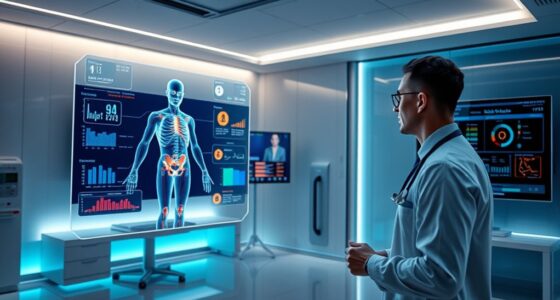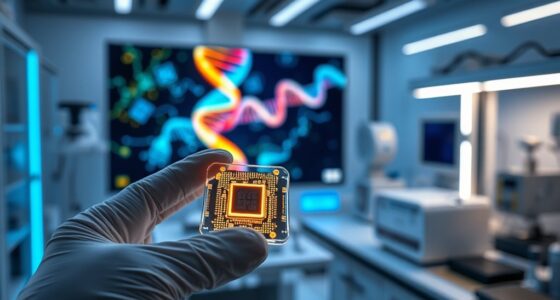At our medical practice, we have seen firsthand the amazing impact of incorporating medical AI into comprehensive diagnostics and care.
By harnessing the capabilities of artificial intelligence, we are able to enhance precision and accuracy, leading to personalized treatment plans for our patients.
Imagine a scenario where AI analyzes an individual’s holistic health data, identifies underlying patterns, and provides tailored recommendations.
This is the future of holistic medicine, where AI becomes an indispensable tool in mastering diagnosis and treatment.

Key Takeaways
- Integration of various modalities and practices
- Addressing the whole person, not just individual symptoms
- Enhancing diagnostic accuracy and treatment efficacy through AI technology
- Personalized treatment plans based on individual patient needs
Benefits of Holistic Diagnosis and Treatment
We have found numerous benefits in implementing holistic diagnosis and treatment methods.
One of the primary advantages of adopting a holistic approach is the integration of various modalities and practices. By incorporating different techniques such as acupuncture, massage therapy, and herbal medicine, we’re able to address the whole person, rather than just focusing on individual symptoms.
This integration allows us to treat not only the physical aspects of a patient’s health but also their emotional, mental, and spiritual well-being. It promotes a more comprehensive and personalized approach to healthcare, leading to improved patient outcomes and satisfaction.
Furthermore, the integration of holistic practices encourages a collaborative and multidisciplinary approach, where healthcare providers work together to achieve optimal results.

As we explore the benefits of holistic diagnosis and treatment, we can now delve into the next section, which discusses the exciting possibilities of integrating medical AI into these practices.
Integrating Medical AI Into Holistic Practices
To integrate Medical AI into holistic practices, we can leverage its capabilities to enhance diagnostic accuracy and treatment efficacy. By integrating AI algorithms into holistic practices, we can achieve significant improvements in patient outcomes.
Here are three ways in which Medical AI can be seamlessly integrated into holistic practices:
- Deep Learning Models: AI algorithms can analyze vast amounts of patient data, including medical records, lab results, and imaging studies, to identify patterns and make accurate diagnoses. This can help holistic practitioners make well-informed decisions and develop personalized treatment plans.
- Predictive Analytics: Medical AI can analyze patient data to predict the likelihood of disease progression and treatment response. By leveraging these predictions, holistic practitioners can optimize treatment strategies and improve patient outcomes.
- Decision Support Systems: AI-powered decision support systems can provide holistic practitioners with evidence-based recommendations for diagnosis and treatment. This can enhance their clinical decision-making process and lead to more effective and efficient care.
Enhancing Precision and Accuracy With AI Technology
One key benefit of integrating AI technology into holistic practices is the enhanced precision and accuracy it provides. AI-driven diagnostics have the potential to greatly improve healthcare outcomes by leveraging advanced algorithms and machine learning techniques. These technologies are capable of analyzing vast amounts of medical data, identifying patterns and correlations that may not be immediately evident to human practitioners. By doing so, AI can assist in the early detection and diagnosis of diseases, leading to more timely interventions and improved patient outcomes.

| Enhanced Precision and Accuracy With AI Technology | |
|---|---|
| 1 | AI technology can identify patterns and correlations in medical data that may not be apparent to human practitioners. |
| 2 | AI-driven diagnostics enable early detection and diagnosis of diseases, leading to more timely interventions. |
| 3 | Improved precision and accuracy of AI technology can contribute to better healthcare outcomes for patients. |
Personalized Treatment Plans With Medical AI
Enhancing patient care through the customization of treatment plans is a vital aspect of utilizing medical AI in holistic practices.
Medical AI has the potential to revolutionize healthcare delivery by providing personalized treatment plans that are tailored to the individual needs of each patient.
By analyzing vast amounts of patient data, medical AI algorithms can identify patterns and trends, allowing healthcare professionals to make more informed decisions about the most effective treatment options.
This not only improves patient outcomes but also optimizes healthcare delivery by reducing unnecessary treatments and minimizing the risk of adverse effects.

With medical AI, healthcare professionals can confidently develop personalized treatment plans that take into account a patient’s unique medical history, preferences, and goals, leading to more effective and efficient care.
The Future of Holistic Medicine With AI
As we look ahead to the future of holistic medicine with AI, our ability to harness the power of medical AI in personalizing treatment plans will continue to revolutionize healthcare delivery. The potential future advancements in this field are vast, from enhancing diagnostic accuracy to improving patient outcomes. However, as we embrace these advancements, it is crucial to address the ethical concerns that arise. One major concern is the potential loss of the human touch in healthcare. While AI can provide data-driven insights and recommendations, it is essential to maintain the human connection between patients and healthcare providers. Additionally, ensuring data privacy and security becomes paramount as AI algorithms rely on massive amounts of personal health information. Striking a balance between the benefits and ethical considerations of AI will be imperative for the future of holistic medicine.
| Future Advancements | Ethical Concerns |
|---|---|
| Enhanced diagnostic accuracy | Loss of human touch in healthcare |
| Improved patient outcomes | Data privacy and security |
| Personalized treatment plans | Ethical use of patient data |
| Efficient healthcare delivery | Algorithm bias and transparency |
Frequently Asked Questions
What Are the Potential Risks or Limitations of Using Medical AI in Holistic Diagnosis and Treatment?
When using medical AI in holistic diagnosis and treatment, potential risks and limitations include privacy and ethical concerns, the need to train healthcare professionals, individual patient preferences, data security, and interpreting AI results.
How Does Medical AI Technology Ensure Patient Privacy and Data Security?
We ensure patient privacy and data security through patient consent and data encryption. By obtaining informed consent, patients have control over their data. Additionally, data encryption safeguards sensitive information, preventing unauthorized access and maintaining confidentiality.

Can Medical AI Adequately Take Into Account Individual Patient Preferences and Emotions During Diagnosis and Treatment?
When considering patient preferences and emotional factors, medical AI can play a crucial role in providing holistic diagnosis and treatment. By analyzing vast amounts of data, it can offer personalized care that takes these factors into account.
Are There Any Ethical Concerns Associated With Using AI Technology in Holistic Medicine?
There are ethical implications of using AI technology in holistic medicine. It may impact the doctor-patient relationship by reducing the personal connection and reliance on human judgment. Careful consideration is required to balance the benefits and risks.
How Can Healthcare Professionals Be TrAIned to Properly Utilize and Interpret the Results Provided by Medical AI Tools?
We train healthcare professionals to master the interpretation of medical AI results through comprehensive training programs. We ensure they understand the nuances and limitations of AI technology to make informed decisions for holistic diagnosis and treatment.
Conclusion
In conclusion, the integration of medical AI into holistic practices has revolutionized the field of medicine. By enhancing precision and accuracy, AI technology allows for personalized treatment plans that cater to individual needs.

The future of holistic medicine is bright, as AI continues to assist in masterfully diagnosing and treating patients. Like a well-oiled machine, the harmonious collaboration between human expertise and AI capabilities creates a seamless and efficient healthcare system, providing optimal care for all.











